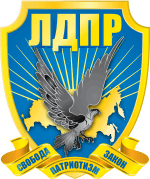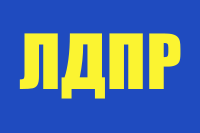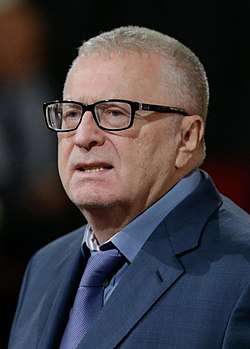Liberal Democratic Party of Russia
The LDPR — Liberal Democratic Party of Russia (Russian: ЛДПР — Либерально-демократическая партия России, Liberalno-demokraticheskaya partiya Rossii),[13][14] briefly, the LDPR or Liberal Democratic Party, is a socially conservative,[8] nationalist,[7] economically interventionist political party in Russia led by Vladimir Zhirinovsky since its founding in 1989.
LDPR — Liberal Democratic Party of Russia ЛДПР — Либерально-демократическая партия России | |
|---|---|
 | |
| Leader | Vladimir Zhirinovsky |
| Parliamentary Leader | Vladimir Zhirinovsky |
| Founded | 18 April 1992[1][2] |
| Preceded by | Liberal Democratic Party of the Soviet Union |
| Headquarters | 1st Basmanny Lane, 3 building 1, Moscow |
| Newspaper | For the Russian People |
| Youth wing | Youth Organization of LDPR |
| Membership (2019) | 295,018[3] |
| Ideology | Russian ultranationalism[4][5] Russian conservatism[6] Right-wing populism[7] Social conservatism[8] Mixed economy[9] Hard Euroscepticism Pan-Slavism |
| Political position | Right-wing[10] to far-right[11][12] |
| Colours | Gold Blue |
| Slogan | "Freedom, Patriotism, Law" |
| Seats in the Federation Council | 6 / 170 |
| Seats in the State Duma | 39 / 450 |
| Governors | 3 / 85 |
| Seats in the Regional Parliaments | 236 / 3,928 |
| Party flag | |
 | |
| Website | |
| ldpr | |
| |
Opposing both communism and neoliberal capitalism of the 1990s, the party scored a major success in the 1993 Russian Duma elections with 22%. In the elections in 2016, the party received 13.14% of the vote, giving it 39 of the 450 seats in the State Duma.
Despite the party's name, it is frequently described as "neither liberal nor democratic".[15] The party has been described as fiscally statist within an ultranationalist authoritarian ideology.[16][17][18] Its ideology is based primarily on Zhirinovsky's ideas of "imperial reconquest" (a "renewed Russian Empire")[19] and on an authoritarian vision of a "Greater Russia"[18][20], with similarities to Soviet Union's expansion vision under Stalin's rule.
History
Creation
An effectively multi-party system emerged in the Soviet Union in the late 1980s in wake of the Mikhail Gorbachev's reforms. A formal law for this purpose was introduced in October 1990. In April 1991, the Liberal Democratic Party of the Soviet Union (LDPSU) became the second officially registered political party in the country.[1] According to former Politburo member Alexander Yakovlev, the new party was a joint project of the Communist Party of the Soviet Union (CPSU) leadership and the KGB. He described how KGB director Vladimir Kryuchkov presented the project of the puppet party at a meeting with Gorbachev and informed him about his selection of leaders and the mechanism of funding. Former KGB General Philipp Bobkov described the organization as "Zubatov's pseudo-party under KGB control that directs interests and sentiments of certain social groups".[21] The outspoken leader of the party, Vladimir Zhirinovsky, an effective media performer,[1] gained 8% of votes during the 1991 presidential elections.[22] He also supported the August 1991 coup attempt. In 1992, the LDPSS broke apart into its regional offsprings and the Liberal Democratic Party of Russia (LDPR) was created as its successor in Russia.
1993–2000
In the 1993 Duma elections, the pro-reform party supporting President Boris Yeltsin, Russia's Choice, received only 15% of the vote and the new Communist Party of the Russian Federation only 12.4%. The LDPR emerged as the winner with 22.9% of the popular vote. In effect, the Russian population was divided to those who supported Yeltsin's reforms and to those who did not. It is regarded that the popularity of Zhirinovsky and his party arose from the electorate's dissatisfaction with Yeltsin and their desire for a non-communist solution.[23]
Zhirinovsky is credited with having successfully identified the problems of ordinary Russians and offering simple remedies to solve them. For example, he has suggested that all leaders of organized crime should be shot and all Chechens deported from Russia.[1] Zhirinovsky also called for territorial expansion of Russia. Many of Zhirinovsky's views are highly controversial and the LDPR's success in the early 1990s shocked observers both inside and outside Russia.[22]
The Duma elected in 1993 was as interim solution and its mandate expired in 1995. During the two years, Zhirinovsky's popularity waned and his party's support was halved in the 1995 elections (11.2%). The Communists emerged as the winners, with 22.3% of the vote.[23]
In the presidential elections of 1996, the LDPR has nominated Vladimir Zhirinovsky as a candidate. Zhirinovsky gained 5.7% of the votes in the first round.
In 1999, the party participated in the elections as a "Bloc of Zhirinovsky" since the Central Election Commission initially refused to register in the election lists of LDPR, which received 6.0% of the votes.[24] In the 3rd State Duma, Zhirinovsky took up the post of Vice Chairman and the post of the head of fraction occupied by his son Igor Lebedev.
2000–2010
In the presidential election of 2000, the party has again put forward Vladimir Zhirinovsky, who won 2.7% of votes.
In the parliamentary elections of 2003, the party won 11.5% of the votes and received 36 seats.
In the 2004 presidential election, the LDPR nominated Oleg Malyshkin. The party leader Vladimir Zhirinovsky was hoping to take the post of Prime Minister in case of Malyshkin's victory on elections. In the end, Malyshkin scored 2% of votes, having lost the election.[25]
In the latest legislative elections in 2007, the LDPR received 5,660,823 votes (8.14%) and received 40 seats in the State Duma.[23]
In the 2008 presidential election, Zhirinovsky was re-nominated as a candidate and scored 9.4% of the vote.
2010–present day
.jpg)
In the parliamentary elections of 2011, the party scored 11.7% of the vote and won 56 seats. In the 6th State Duma, Vladimir Zhirinovsky returned to the post of head of the LDPR faction and his son Igor Lebedev has held the position of Vice Chairman of the State Duma.
In the presidential elections 2012, the party again put forward by Zhirinovsky, whose campaign slogan for 2012 was "Vote Zhirinovsky, or things will get worse".[26] Proshka, a donkey owned by Zhirinovsky, became prominent during the presidential campaign when he was filmed in an election advertisement video. On the last episode of debates with Mikhail Prokhorov just before the elections, Zhirinovsky produced a scandal by calling those Russian celebrities which supported Prokhorov, including a pop-diva and a veteran of Russian pop scene Alla Pugacheva, "prostitutes" ("I thought you are an artful person, politician, cunning man, but you are just a clown and a psycho", replied Pugacheva. "I am what I am. And such is my charm", replied Zhirinovsky).[27] As a result, Zhirinovsky gained 6.2% of the votes.
In the parliamentary elections in 2016, the party improved its result compared to the previous elections. The LDPR surpassed the center-left party A Just Russia, becoming the third largest party in the State Duma. The LDPR won 39 seats, gaining 13.1% of the vote, nearly reaching the second placed Communist Party, which won 13.3% of votes and 42 seats.
In 2015, Zhirinovsky expressed a desire to participate in the presidential elections in 2018. However, originally and in the past potential candidates from LDPR Zhirinovsky also called his son Igor Lebedev as well as close associates of Mikhail Degtyarev, Yaroslav Nilov and Alexei Didenko.[28] After the parliamentary elections of 2016, Zhirinovsky said he would run himself.[29] According to public opinion polls, Zhirinovsky is the second most popular candidate as over 10% of the electorate would vote for him, which is two times more than the Communist Party leader Gennady Zyuganov, who has always taken second place in the elections.[30]
On 9 July 2020, the popular governor of the Khabarovsk Krai and member of the LDPR, Sergei Furgal, who defeated the candidate of Putin's United Russia party in elections two years ago, was arrested and flown to Moscow on charges of involvement in the murders of several businessmen in 2004-05.[31] He denied the allegations.[32] Every day since June 11, mass protests have been held in the Khabarovsk Krai in support of Furgal. On 20 July, President Vladimir Putin dismissed Sergei Furgal and appointed Moscow-based politician Mikhail Degtyarev, who is also a member of the LDPR, as acting governor. Several regional lawmakers in Khabarovsk opted to leave the LDPR in protest against Furgal's dismissal.[33] The protests included chants of "shame on LDPR".[34]
Platform
The LDPR seeks "a revival of Russia as a great power". It opposes both the Communism of the Soviet Union[35] and neoliberal capitalism. It prefers a mixed economy with private ownership, but with a strong management role reserved for the state. In foreign policy, the party places a strong emphasis on "civilizations". It has supported the restoration of Russia with its "natural borders" (which the party believes include Transcaucasia, Central Asia, Belarus and Ukraine).[36] The LDPR regards the United States, NATO[37] and Western civilization as Russia's main external threats. The party has harshly criticised the discrimination against ethnic Russians in the Baltic states and demanded that they should be given Russian citizenship and protected against discriminatory legislation.[1] The LDPR is also against corruption[38] and enlargement of the European Union, identifying as a Eurosceptic party,[39] instead preferring pan-Slavism.[40] The LDPR also identify as Russian imperialists both in their support for a restored Russian Empire and support for imperialism.[41] Professor Henry E. Hale lists the party's main policy stands as nationalism and a focus in law and order. Although it often uses radical opposition rhetoric, the LDPR frequently votes for government proposals. This has led to speculation that the party receives funding from the Kremlin.[22]
Structure and membership

The party's organization is almost entirely centered on its leader Vladimir Zhirinovsky.[22]
The party is in alliance with several parties in the former Soviet republics, including Armenia, Belarus, Estonia and Ukraine.
In 2003, the party claimed 600,000 members and had issued 475,000 party cards.[1] According to a 2008 survey by Colton, Hale and McFaul, 4% of the Russian population are loyalists of the party.[22]
Electoral results
Legislative elections
| State Duma | ||||||
| Election year | No. of overall votes |
% of overall vote |
No. of overall seats won |
+/– | Leader | |
|---|---|---|---|---|---|---|
| 1993 | 12,318,562 (1st) | 22.9 | 70 / 450 |
|||
| 1995 | 7,737,431 (2nd) | 11.18 | 51 / 450 |
|||
| 1999 | 3,990,038 (5th) | 5.98 | 17 / 450 |
|||
| 2003 | 6,943,885 (3rd) | 11.45 | 36 / 450 |
|||
| 2007 | 5,660,823 (3rd) | 8.14 | 40 / 450 |
|||
| 2011 | 7,664,570 (4th) | 11.67 | 56 / 450 |
|||
| 2016 | 6,917,063 (3rd) | 13.24 | 39 / 450 |
|||
Presidential elections
| Election year | No. of overall votes |
% of overall vote |
Candidate |
|---|---|---|---|
| 1991 | 6,211,007 (3rd) | 8.0 | Vladimir Zhirinovsky |
| 1996 | 4,311,479 (5th) | 5.8 | Vladimir Zhirinovsky |
| 2000 | 2,026,509 (5th) | 2.7 | Vladimir Zhirinovsky |
| 2004 | 1,405,326 (5th) | 2.0 | Oleg Malyshkin |
| 2008 | 6,988,510 (3rd) | 9.5 | Vladimir Zhirinovsky |
| 2012 | 4,448,959 (4th) | 6.2 | Vladimir Zhirinovsky |
| 2018 | 4,154,985 (3rd) | 5.7 | Vladimir Zhirinovsky |
See also
- Liberal Democratic Party of Belarus
- Liberal Democratic Party of Pridnestrovie
- List of Liberal Democratic Party of Russia deputies in the State Duma
- Miflaga Mitkademet Liberalit Demokratit
References
- White, Stephen (2005). "The Political Parties". In White; Gitelman; Sakwa (eds.). Developments in Russian Politics. 6. Duke University Press. ISBN 0-8223-3522-0.
- Russiaprofile Archived 20 January 2011 at the Wayback Machine
- (in Russian) Партия — ЛДПР // архивировано 06.03.2019
- "Ultranationalists Move to Slap Fines on Use of Foreign Words". 21 February 2013.
- Russia's Trump, Vladimir Zhirinovsky, Wants to Build a Wall, Ban Muslims, and Nuke the White House.
- "A Russian Politician Thinks U2's Album Cover Is 'Gay Propaganda'". TIME. 30 April 2015.
- Nordsieck, Wolfram (2016). "Russia". Parties and Elections in Europe. Retrieved 20 August 2018.
- Oates, Sarah (May 9, 2013). "Revolution Stalled: The Political Limits of the Internet in the Post-Soviet Sphere". OUP USA – via Google Books.
- Russian Government and Politics.
- Colton, Timothy J.; Hough, Jerry F. (1 December 2010). Growing Pains: Russian Democracy and the Election of 1993. Brookings Institution Press. ISBN 9780815715009. Retrieved 21 September 2019.
- Dorell, Oren. "Putin's Russia: These are the candidates in an election some call a charade". USA Today. Retrieved 21 September 2019.
- Stanovaya, Tatyana. "The End of Kremlin's Dominance in the Regions". The Moscow Times. Retrieved 21 September 2019.
- "Устав ЛДПР". ldpr.ru. Retrieved 27 June 2018.
- "Партия — Официальный сайт ЛДПР, информационное агентство ЛДПР, новости ЛДПР". ldpr.ru. Retrieved 15 September 2017.
- Timothy Colton, Yeltsin: A Life (2011), p. 282; Donald J. Raleigh, Soviet Baby Boomers: An Oral History of Russia's Cold War Generation, p. 327; The troubled birth of Russian democracy: parties, personalities, and programs. p. 244.
- Russian Political Parties Directory (1999), p. 65.
- Peter H. Merkl and Leonard Weinberg, Right-wing Extremism in the Twenty-first Century (2003). Psychology Press: p. x.
- Hans-Georg Betz, Radical right-wing populism in Western Europe (1994). Palgrave Macmillan: p. 23.
- Stephen E. Hanson, Post-Imperial Democracies: Ideology and Party Formation in Third Republic France, Weimar Germany, and Post-Soviet Russia (2011). Cambridge University Press.
- John B. Dunlop, The Rise of Russia and the Fall of the Soviet Empire (2011). Princeton University Press, p. 167.
- Alexander Nikolaevich Yakovlev Time of darkness, Moscow, 2003, ISBN 5-85646-097-9, page 574 (Russian: Яковлев А. Сумерки. Москва: Материк 2003 г.). The book provides an official copy of a document providing the initial party funding (3 million rubles) from the CPSU money
- Hale, Henry E. (2010). "Russia's political parties and their substitutes". In White, Stephen (ed.). Developments in Russian Politics 7. New York: Palgrave Macmillan. ISBN 978-0-230-22449-0.
- McFaul, Michael; Stoner-Weiss, Kathryn (2010). "Elections and Voters". In White, Stephen (ed.). Developments in Russian Politics 7. New York: Palgrave Macmillan. ISBN 978-0-230-22449-0.
- "ИТОГИ ВЫБОРОВ В ГОСУДАРСТВЕННУЮ ДУМУ". panorama.ru. Retrieved 15 September 2017.
- "По отработанному сценарию". Archived from the original on 27 September 2007. Retrieved 15 September 2017.
- "Profiles of Russia's 2012 presidential election candidates". BBC. 1 March 2012. Retrieved 15 September 2017.
- "Жириновский устроил скандал на дебатах с Пугачевой". Retrieved 15 September 2017.
- "Жириновский пойдёт на выборы президента с четырьмя преемниками". Life.ru.
- "Владимир Жириновский снова собрался в президенты". 28 October 2016. Retrieved 15 September 2017 – via Kommersant.
- "В. Путин: рейтинг, отношение, оценки работы / ФОМ". fom.ru. Retrieved 15 September 2017.
- "News Russia's city Khabarovsk rises against Vladimir Putin". Deutsche Welle. 4 August 2020.
- "Sergei Furgal: The arrest fuelling anti-Moscow anger in Russia's far east". BBC News. 17 July 2020.
- "Anti-Putin Protests in Russia's Far East Gather Steam". VOA News. 25 July 2020.
- "Anger at Kremlin Grows in Latest Massive Russian Far East Protest". The Moscow Times. 25 July 2020.
- Wodak, Ruth (21 September 2015). "The Politics of Fear: What Right-Wing Populist Discourses Mean". SAGE. Retrieved 15 September 2017 – via Google Books.
- "СТРУКТУРА | ИСТОРИЯ | ПРОГРАММА | УСТАВ | ГИМН || ЛДПР". ldpr.ru.
- Russia and the Western Far Right: Tango Noir.
- "Archived copy". Archived from the original on 2017-09-05. Retrieved 2017-09-04.CS1 maint: archived copy as title (link)
- "How Moscow is spreading its propaganda using EU-funded media - InformNapalm.org (English)". 12 March 2017. Retrieved 15 September 2017.
- IBP USA Russia Parliament Encyclopedic Directory Strategic Information and Contacts p. 259.
- "Kuchins Zevelev". (PDF)
Allah's Mountains. Retrieved 16 March 2015.
External links
- Official Website (in Russian)
- Political Program LDPR
- Zhirinovsky's 2007 political manifesto (in English and Russian)
- Non-official Website (in Russian)